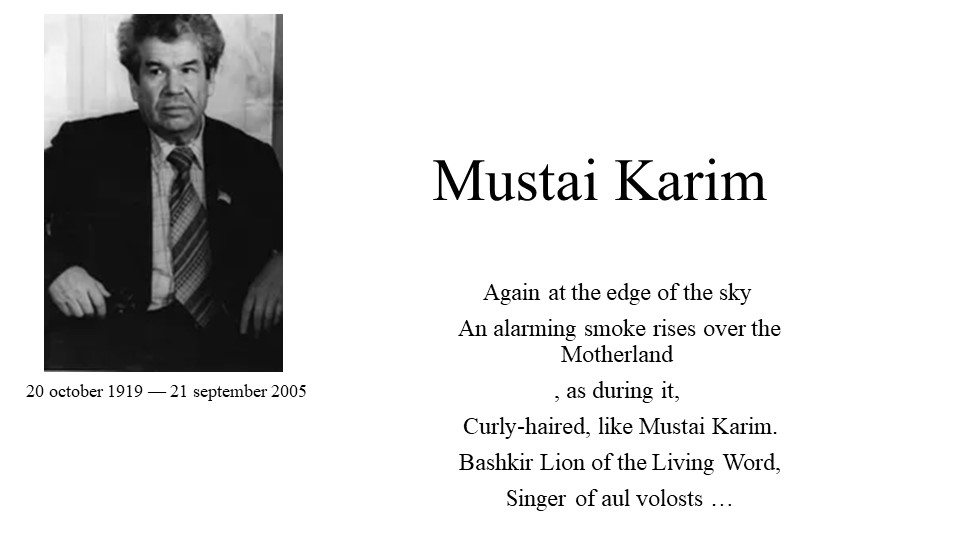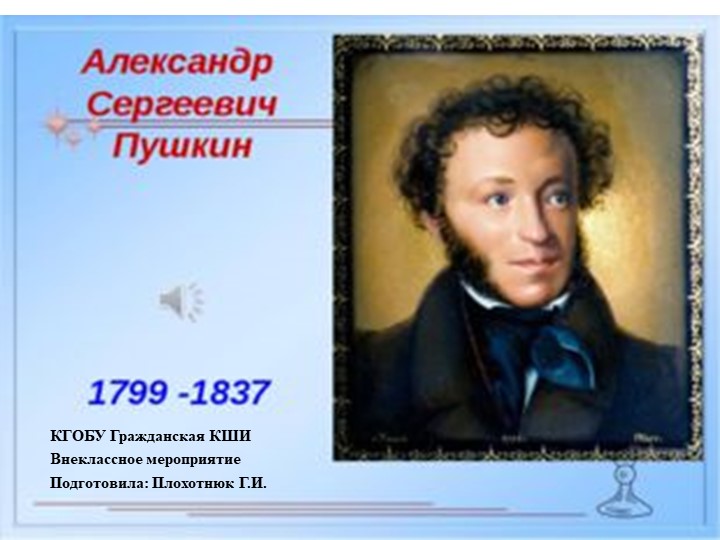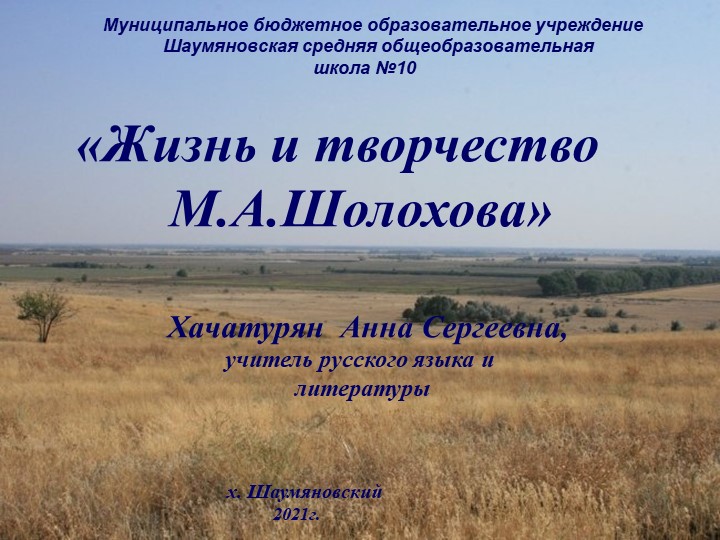Презентация - "Презентация для 11 класса "Жизнь и творчество Mustai Karim""

- Презентации / Другие презентации
- 0
- 22.10.23
Просмотреть и скачать презентацию на тему "Презентация для 11 класса "Жизнь и творчество Mustai Karim""
Сайт klass-uchebnik.com предлагает качественные учебные материалы для школьников, родителей и учителей. Здесь можно бесплатно читать и скачивать современные учебники, рабочие тетради, а также наглядные презентации по всем предметам школьной программы. Материалы распределены по классам и темам, что делает поиск максимально удобным. Каждое пособие отличается логичной структурой, доступной подачей материала и соответствует действующим образовательным стандартам. Благодаря простому языку, наглядным схемам и практическим заданиям, обучение становится легче и эффективнее. Учебники подойдут как для ежедневной подготовки к урокам, так и для систематического повторения перед экзаменами.
Особое внимание стоит уделить разделу с презентациями - они становятся отличным визуальным дополнением к теории, помогают лучше понять сложные темы и удерживают внимание учащихся. Такие материалы удобно использовать в классе на интерактивной доске или при самостоятельной подготовке дома. Все размещённые на платформе материалы проверены на актуальность и соответствие учебной программе. Это делает сайт надёжным помощником в образовательном процессе для всех участников: школьников, учителей и родителей. Особенно удобно, что всё доступно онлайн без регистрации и в свободном доступе.
Если вы ищете надежный источник для подготовки к урокам, контрольным и экзаменам - klass-uchebnik.com станет отличным выбором. Здесь вы найдёте всё необходимое, включая "Презентация для 11 класса "Жизнь и творчество Mustai Karim"", чтобы сделать обучение более организованным, интересным и результативным.
Mustai Karim
Again at the edge of the sky
An alarming smoke rises over the Motherland
, as during it,
Curly-haired, like Mustai Karim.
Bashkir Lion of the Living Word,
Singer of aul volosts …
20 october 1919 — 21 september 2005
Mustai Karim (bask. and tat. Mustai Karim, real name Mustafa Safich Karimov (bask. and tat. Mustafa Safaevich Karimov; October 20, 1919 - September 21, 2005) was a Bashkir poet, writer and playwright. Hero of Socialist Labor (1979). Honored Artist of the RSFSR (1982). People's poet of the Bashkir ASSR (1963). Laureate of the Stanislavsky State Prize of the RSFSR (1967), the USSR State (1972) and Lenin (1984) Prizes. Knight of two Orders of Lenin (1967, 1979). Member of the CPSU (b) since 1944
Mustai Karim began to write poems as a child, at the age of 19, the Bashkir poet has already published his first collection. He composed not only poetry, but also prose, and performances based on his plays gathered full halls. "Mustai Karim will remain the cherished face of Bashkirs," the writer Chingiz Aitmatov said about him.
Childhood of the writer
Mustafa Karimov was born and raised in the Bashkir village of Klyash, near Ufa. His father, Safa, professed Islam, and the religion allowed him to have two wives. 12 children were brought up in a large family. All of them helped their parents to run the household from an early age: Mustai was watching the horses.
The boy's mother, Wazifa, loved music and dancing. When she finished the housework early, she organized home concerts and performances for children. The "elder mother", Minleyamal, knew many folk tales and told them at night around the campfire, then during a walk in the forest or in the mountains.
By the end of the 1920s, collectivization began in the country. The middle peasants of Karimov were among the first in the village to join the collective farm.
Childhood of the writer
After reading "A Long, long childhood”, you feel as if you are standing next to the Elder Mother, calmly and reliably, as if she does not know sadness and suffering, diligence and death, only a slight smile on her face. Thanks to her, the rumor called little Mustafa "Navel"..
Mustai Karim 's House
The village of Klyash squints at the sun with many windows. Its streets rapidly run up a steep hill, then converge at the well, then rush to the outskirts, open to the steppe……
Karim is a correspondent and writer
In 1932, Mustai Karim and his younger sister graduated from primary school and moved to secondary school, which was recently opened in the village. Parents were proud of their children: they themselves were illiterate. Since the sixth grade, Karimov began to write poems about his childhood. Noticing this, the teachers advised to give the works to the children's newspaper "Young Builder". The writer's debut took place at the age of 16.
In 1935, Mustai Karim entered the Ufa Pedagogical Labor Faculty. Here he spent two years preparing for university: he studied the school curriculum and studied the basics of his future profession. The young man successfully mastered all the courses, and in 1937 he was enrolled in the Faculty of Language and Literature at the Bashkir Pedagogical Institute. Timiryazev.
From the first year, he got a job as a correspondent for the newspaper "Leninets" and the magazine "Pioneer", where he met Bayazit Bikbayev, a well-known poet in Bashkortostan. Bikbayev read the works of the young man and invited him to be published in the magazine "October" - the monthly publication of the Writers' Union. Soon Karim published there a story about the civil war "An Unknown guest".
In 1938, when Mustai Karim turned 19, his first collection of poems, "The Detachment has Moved", was published. "The book that we released with Vali Nafikov, we called "The squad has started." We didn't know then that the squad, when it sets off, most of all wants to look back… We learned this from
Mustai Karim and his wife
During his studies in Ufa, Karim rented an apartment in a wooden house on Dostoevsky Street. One day, a niece, Rauza Sufyanovna, came to visit the hostess of the house. The girl studied at the Faculty of Pedagogy and was preparing to become a teacher.
Young people met and fell in love. "A little while passed, and we both felt as if we had not met for the first time, but as if we had found each other through a long separation," Mustai Karim wrote in his memoir Moments of Life.
They graduated from university in June and got married a few days after graduation. As novice specialists, the Karimovs received a referral to the Ermekeyevsky district. But only the writer's wife went there: the Great Patriotic War began.
1941-1945
In 1941, he graduated from the Faculty of Language and Literature of the Bashkir State Pedagogical Institute. After graduation, he was drafted into the Red Army and sent to the Murom School of Communications. In May 1942, with the rank of second lieutenant, he was sent to the 17th Motorized Rifle Brigade as the chief of communications of the artillery division.
"Bashkiria, I'm far away again
From your stars, but not separated from them.
Wherever you are, on my tongue
Always your only name."
The writer's military unit was sent to the Bryansk Front. The soldiers had to pull the German troops away from Stalingrad. On the morning of August 25, 1942, near Mtsensk, Karim was wounded by a shell fragment. He was treated in the rear hospitals for six months. "In well-placed, hay-covered huts, we lie for four or five people. September was surprisingly warm in those parts.
Still picked up a pencil. I sat down behind a hut under a huge oak tree, leaned my back against the trunk ...
For almost half a year, inspiration came to my soul, not a single poetic thought came to my head. And so they came," Karim recalled in the book "Moments of Life". In just a week he finished work on the first part of the poem "Ulmesbay" ("Immortal") about a brave soldier in the war.
At the beginning of 1943, he returned to the front line, but as a journalist. Mustai Karim wrote in Tatar for the frontline newspaper "For the Honor of the Motherland", then he was transferred as a correspondent to the publication of the 3rd Ukrainian Front "Soviet Warrior". Karim was awarded the Order of the Patriotic War II degree, medals "For the Liberation of Belgrade", "For the capture of Budapest" and "For the capture of Vienna". He met Victory Day in Austria, where he was sent by the editorial board.
"... The boundary of two cultures": the poet's post-war work
When the war ended, Mustai Karim returned home to Ufa. He saw his son for the first time: the boy was born shortly after he left for the front. The writer began to process front-line essays into literary works. In 1947, the poet's collection "The Return" was published about the long journey of soldiers to their homeland. At the same time, he tried himself as a playwright: he finished the play "The Wedding Continues".
In 1963, Mustai Karim was recognized as the People's poet of Bashkortostan. He finished work on the tragedy "On the night of the lunar eclipse". The action of the play unfolded in the Bashkir steppe of the XVII century, in which the new generation of the ruling family refused to follow the traditions of the clan. His later plays were also staged on the stage of the Bashkir Drama Theater: "The Country of Aigul", "Salavat", "Don't throw fire, Prometheus!".
Mature work and social activities
The first collection of the writer's works in Bashkir was published in 1971: the publishing house "Bashknigoizdat" published five volumes of works by Mustai Karim. Seven years later, he turned to childhood memories and wrote an autobiographical novel "A Long, long Childhood." It was translated into other languages. "What joy you have brought me, if you only knew! My book is in the Yakut language! I am infinitely grateful to you for your great work, most importantly, for your kind, cordial attitude towards me and my work," Karim wrote in a letter to Yakut writer Mikhail Timofeev. In 1984, for the novel "A Long, long Childhood" and the play "Don't throw fire, Prometheus!" the writer was awarded the Lenin Prize.
In 1985, Mustai Karim completed the work "Pardon", based on his story from the front. "In the battles for Vienna, we can say he was in the thick of it. I saw the reckless bravery of our soldiers in battle, and their conscious mercy ... in the midst of the battles, when the building of the famous Vienna Opera was engulfed in flames, by order of someone from the command, part of the troops, leaving their positions, rushed to extinguish the fire. And put it out," he wrote in his memoirs.
After the collapse of the Soviet Union, the writer advocated the preservation of the national language and, as a deputy of the Supreme Council of Bashkortostan, suggested that the presidents of the republic should necessarily know the Bashkir language. And today this additional requirement is spelled out in the regional election law.
In 2004, Mustai Karimov was awarded the Order of Merit for the Fatherland, II degree, for his outstanding contribution to the development of Russian literature and many years of creative activity. At the same time, his book of memoirs "Moments of Life" was published.
















